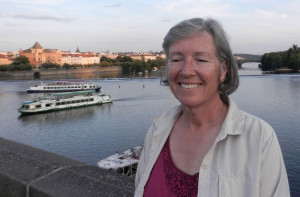By Michele Straube for EDRblog.org
Recent experiences have made me feel bi-polar about our capability to have respectful dialogue on environmental and natural resource issues. I realize that people speak passionately about issues on which they feel passionately. But is accusation and lack of empathy essential to maintain that passion while still engaging in a civil and constructive conversation? At the end of the day, I remain optimistic that it is not.
Two experiences fall into what I call the “Jane, you ignorant slut” category. In the early years of Saturday Night Live, the show parodied the “Point/Counterpoint” segment of the 60 Minutes news show by presenting opposing views on a given topic. Dan Aykroyd and Jane Curtin were regular presenters, often starting their opposing arguments with “Jane, you ignorant slut” or “Dan, you pompous a**.” The “debate” could be described as a wrestling match in words. It was funny, but no one was persuaded by either point of view.
The descriptions in this blog post of my recent experiences are intentionally vague to protect confidentiality and obfuscate attribution. I hope to share the overall effect of the experiences, rather than the details.
In the first experience, I observed a group comprised of individuals with significantly different viewpoints, yet who were nevertheless carefully building some degree of common ground in the room. Then entered another individual who, without having heard any of the previous presentations or understanding the common ground context that was delicately being built, gave an emotionally charged speech that served only to re-polarize the discussion.
In the second experience, an individual from one stakeholder interest who purported to be involved in a collaborative problem-solving group unquestioningly stated that another interest in the group was not likely to stay in business for much longer, and therefore their concerns should not be given great legitimacy.
After dismissing the validity of the contrary perspective, each of these two individuals concluded with the promise that they were open to listening and willing to seek win-win solutions. Those were difficult messages to hear or trust, coming right on the tails of a personal attack.
If these two experiences had been my only data points for the past two weeks, I’d be pessimistic that we’ll ever move beyond name-calling and flame-throwing. Fortunately, other experiences in the same time frame show me that as humans, we can and do modulate the emotions that accompany our strong convictions.
In two separate instances, individuals with a reputation for antagonistic behavior and perpetuating “us v. them” perceptions asked difficult questions in a public forum in a way that demonstrated both curiosity and a conscious effort to overcome assumptions about bad motives among other stakeholders.
I have recently adopted a new ground rule that serves as an umbrella for all the more detailed behavioral norms: “Please take responsibility for the energy you bring into this space [conversation].” I borrowed it shamelessly from Jill Bolte Taylor, a brain scientist who documented her own stroke and recovery of her ability to think, walk and talk over the next eight years in her book, “My Stroke of Insight,” and related TED Talk.
The stroke shut down the analytical portion of Dr. Taylor’s brain, leaving the emotional portion intact. As she started to rebuild her analytical capabilities, she noticed that her emotional state could totally obstruct the ability to focus and that the emotional state of others in the room (particularly anger, sadness or pity) affected her emotional state. She posted a sign containing my new ground rule on her hospital door – “please take responsibility for the energy you bring into this space” – and saw a remarked change in the emotional affect her visitors presented to her (more supportive) and the positive impact this had on her emotions and her recovery.
 My several experiences over the past two weeks show me that it is possible for each of us to take responsibility for the energy we bring to a difficult conversation, and more people should try it.
My several experiences over the past two weeks show me that it is possible for each of us to take responsibility for the energy we bring to a difficult conversation, and more people should try it.
Michele Straube is Director of the Environmental Dispute Resolution program at the Wallace Stegner Center, S.J. Quinney College of Law, University of Utah. She has been diagnosed with eternal optimism.
